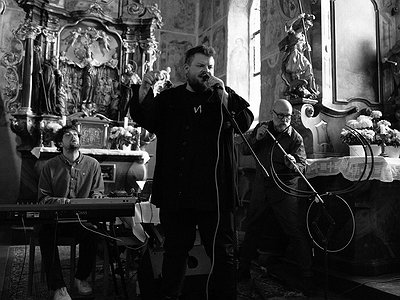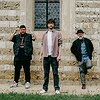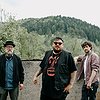Name: die hunde
Members: Jeremias Heppeler (vocals), Christof Heppeler (noise), for the current project: Jan Wagner (synth, piano)
Interviewee: Jeremias Heppeler
Nationality: German
Current release: New EP Leben Ohne Licht via Klangbad Records
Recommendations: I would very much like to recommend a computer game: It's called Citizen Sleeper and it tells a great science fiction story using the simplest resources. It is brilliantly written and lives from magnificent artworks and an unusual soundtrack.
Then I would like to recommend the song “Hypnosis” by Mondo Sangue feat. Dirk von Lowtzow. The band mostly quotes soundtracks of the Italian Giallo genre, totally exciting.
[Read our Jan Wagner interview]
If you enjoyed this die hunde interview and would like to keep up to date with the band, visit the official website of Jeremias Heppeler for current live dates and more information.
When I listen to music, I see shapes, objects and colours. What happens in your body when you're listening? Do you listen with your eyes open or closed?
I live in the Danube Valley, deep in the South. I mostly listen to music in the forest. And depending on how much it touches me, the trees change. They appear more dangerous or more powerful or simply more beautiful. And sometimes they even disappear. The entire scenario shifts from time to time.
Entering new worlds and escapism through music have always exerted a very strong pull on me. What do you think you are drawn to most when it comes to listening to and creating music?
As an intermedia artist, who also works visually and with other media such as film and theater, there is one thing that connects all the threads for me: the opportunity to tell stories. Narratives. With our band “die hunde” we play a genre that we call “Spoken Ambient”, which leaves a lot of room to really work lyrically.
Jan Wagner, who composes and produces most of our songs, perceived our first works together as radio plays. For me, as a writer, they were songs. These spaces in-between fascinate me. Because that's exactly where those new worlds are created.
When it comes to listening, I always search for moments, where the lyrical framework (in concrete collaboration with the composition) has the chance to design new vibrant spaces, that I can throw myself into. Like those paintings in Super Mario 64.
What were your very first steps in music like and how would you rate the gains made through experience?
I started with my father doing very raw and hard noise music on self-built instruments, mostly in the context of art exhibitions. In combination with pretty raw lyrical experiments, our admiration for bands like Einstürzende Neubauten was quite obvious.
It was Jan who gave me the impulse to give space to silence and slowness. And I think that was a crucial moment. Every outburst is twice or three times as intense if you establish a silence that needs to be broken. Or that can stay, in all its fragility.
According to scientific studies, we make our deepest and most incisive musical experiences between the ages of 13-16. What did music mean to you at that age and what’s changed since then?
I was addicted to music. It determined my thinking. My everyday life. My personality. I was a village punk in the Swabian province and read Kurt Cobain biographies until they fell apart.
Today I have a more distant relationship, my emotions are no longer as strong as they were back then and i don´t believe that one song can completely turn my world upside down. A thing that happened practically when I was a teenager.
Music today is more of a score for me than a soundtrack. It carries my moods, it influences my perception, but it no longer takes over entire scenes.
How would you describe your own relationship with your instrument, tools or equipment?
Archaic. I haven't learned to play an instrument, but modern technology makes it possible for me to compose and experiment with a playful approach. I love that very much.
However, I have a piece of equipment that has been with me for a long time and with which I have a special relationship. My father's old tape deck, which I repeatedly unpacked and used in crucial live moments. According to Ebay, you could make quite a bit of money if you sold it, but that's out of the question. Without it I'm no longer a musician.
Where does the impulse to create something come from for you? What role do often-quoted sources of inspiration like dreams, other forms of art, personal relationships, politics etc play?
Hm, that will sound pretty corny, but … I can't help it.
I've even found that I recover better if I spend at least a few minutes writing texts while on vacation. That somehow comes out of me. I really was quite a pop culture nerd from a young age, there are baby photos of me staring into books or cleaning out bookshelves, and to this day I still try to consume stories in different media on a daily basis. And somehow this kind of useless knowledge in the form of all those stories accumulate and reassemble themselves.
My greatest source of inspiration is always when I see a piece of pop culture and I don't understand how it was made. When I realize that with my skillz I will never be able to create something like that. But then I want to try it - with my means. My own language.
During my studies, my dream was to become a music journalist and because I had no idea of instruments and technology, I found a weird and abstract approach to music. Somehow I have very concrete ideas about song ideas or structures in general, but no vocabulary to formulate them in a technically right way. So I wrap them up as stories, in an awkward transfer between non-verbal and verbal language.
And poor people like Jan then have to translate it.
Are you acting out parts of your personality in your music which you couldn't or wouldn't in your daily life? If so, which are these? What, would you say, are the key ideas behind your approach to music?
In real life, but also in my work as a visual artist, I work very fast. I would love it if there would be the possibility to publish everything I create on the same day. Get out with it. I also talk very quickly and very loudly, which sometimes annoys me. And I always have problems with expressing my feelings. I usually keep them with me.
For some reason it's different with music, where I like to take my time. To hone every word. To search. And experiment. Even letting some things rest or even discarding them. For me, music is a tool through which I can discover shades of myself that I been hiding. A multidimensional mirror. I can use it to solve things that have been stuck for a long time.
And because of that, the most beautiful moment is when someone listens to this stuff, fights through all the metaphors and understands it. Then I feel understood. Somehow. It shows me: Hey, you're not alone.
die hunde Interview Image by Nina Maier
If music is a language, what can we communicate with it? How do you deal with misunderstandings?
I think we can say anything with it. For sure. But to follow on from my previous answer: Music is an incredible way of making feelings visible.
I actually believe that errors and glitches are a very central moment in contemporary art. And I would also classify misunderstandings there. Sometimes misunderstanding creates a new perspective on things that were previously unthinkable. I really appreciate it. But I think that because of the progressive professionalization at all levels of music, at least for pieces that are recorded and released, we are reducing the possibility of misunderstandings to a minimum. I find that a bit sad sometimes.
In that context, the live situation becomes even more important, because you are much more vulnerable on stage.
Making music, in the beginning, is often playful and about discovery. How do you retain a sense of playfulness and how do you still draw surprises from tools, approaches and musical forms you may be very familiar with?
I'm a big fan of genres and really like jumping into different styles and playing with them. With "die hunde" I also incorporated some 80s Neue Deutsche Welle / Kraftwerk vibes and we called that DARKSCHLAGER. I think it helps to try out new systems with clear rules and then break them. Anything and everything at the same time.
Lyrically, I think my playful use of quotes helps me to stay fresh. In the hook of our song “Flimmern (The Future is so bright”) I quoted Kendrick Lamar and Twin Peaks. This use of other language-patterns breaks your own style and provokes new structures.
For me quotes are for the most central DNA strands in pop culture - which is of course not groundbreaking news. With all the music out there and the chance for all of us to release it properly, the fewer gaps remain undiscovered. The only thing that helps is: rip it off or cut it up and reassemble it.
die hunde Interview Image by Nina Maier
Sound, song, and rhythm are all around us, from animal noises to the waves of the ocean. What, if any, are some of the most moving experiences you've had with these non-human-made sounds? In how far would you describe them as “musical”?
In the summer I spent a night with friends in a cave in the Danube Valley and it was quite fascinating how in the morning, parallel to the sunrise, the sound of life slowly faded in while the wind constantly rattled through the cave. The perfect intro for a day.
For someone who is rooted in noise and ambient, it would be quite cheeky to deny the world its musicality. Discover the in-between!
There seems to be an increasing trend to capture music in algorithms, and data. But already at the time of Plato, arithmetic, geometry, and music were considered closely connected. How do you see that connection yourself? What aspects of music do you feel can be captured through numbers, and which can not?
With my very raw approach to music, I'm probably the wrong person to talk to. For me, numbers don't really matter at first because every number immediately unsettles me and throws me off course.
But: Numbers are also symbols. Metaphors. And I like it when they function as a subtext, as a little system behind the system that has the potential to be uncovered by conspiracy theorists at some point in the future.
But sorry, I drifted on that one: I actually believe that our digital reality is so intensively influenced by algorithms that if you really want to be successful, you inevitably have to deal with the rules and numbers. That's kind of annoying. But: It is your own and yor free decision. We, as a subculture, have the power to develop countersystems together.
How does the way you make music reflect the way you live your life? Can we learn lessons about life by understanding music on a deeper level?
It helps me pause. To take a breath. To perceive myself. When it comes to art, I'm impulsive. I want to create things, but often the next idea catches up with me before I've finished the first one.
But music demands a different kind of attention. There's this great German coming-of-age movie called Absolute Giganten. And the most famous quote from this film is: "You know what I think sometimes? There should always be music."
Anyone who has ever edited a film knows how a piece of music can change a scene. Thoroughly. The smallest observations become fundamental moments. A simple look suddenly has the potential to radiate infinite sadness. Maybe music can help us truly appreciate the little things in everyday life. To really notice them. With all its value. Maybe music can help us stop the world from just passing us by.
We can surround us with sound every second of the day. The great pianist Glenn Gould even considered this the ultimate delight. How do you see that yourself and what importance does silence hold?
I find it incredibly difficult to endure silence. I think it's because we associate it with loneliness. But when you're standing on a stage, there's nothing more beautiful than deep silence. The kind of silence that you only notice afterwards. But in that situation you know that you are not alone. It's a safe silence. That is the crucial difference.
Last year I shot a space opera with my art-collective "Dieter Meiers Rinderfarm" whose villain was DARK SATIE, a time-traveling, crazy version of Erik Satie. DARK SATIE's ultimate goal was irretrievable silence. He wanted to silence the world, because he hated pop-music with every vein in his body. And on our EP Leben ohne Licht I wrote the line: “The greatest error is to be paralyzed by the fear of silence". So yeah, this question bothers me for quite some time and I hope that one day I can give a more satisfactory answer.
Do you feel as though writing or performing a piece of music is inherently different from something like making a great cup of coffee? What do you express through music that you couldn't or wouldn't in more 'mundane' tasks?
Perhaps the mix is particularly important here. On the one hand, creating should feel totally normal. Inherent. Because then you are in your zone, then everything comes naturally to you. But you should also give yourself the chance to feel when something special happens. When you find something in your composition that you have been looking for for a long time.
And of course it makes a difference whether you're cooking something quick for yourself or preparing a whole dinner for your friends and family.
If you could make a wish for the future – what are developments in music you would like to see and hear?
I think it would be really exciting if more artists left genre boundaries behind them. Leave your comfort zone. Sure, I used to hate it when the second album of my new favorite band suddenly sounded completely different. And even more so when the third one only had generic pop to offer. But I mean real, sincere experiments.
In the summer I visited this amazing punk festival in Iceland to make a documentary. Nordanpaunk. Practically the entire subculture scene on the island takes place there. And the bands are all incredibly good. I asked myself: How can they all be so good?
The Icelandic scene is naturally not huge, which means that many musicians play in numerous bands. And in different genres, because a friend's band urgently needs a drummer and he ask you and you could never say no to him. So suddenly you're playing in a punk band, a black metal group, you're playing hardcore and dream pop. And of course this automatically leads to really exciting mashups and always new challenges. Totally terrific.
I believe there is immense potential here for the future … There is still a lot to discover out there.






